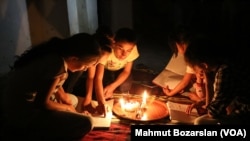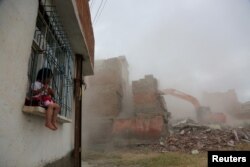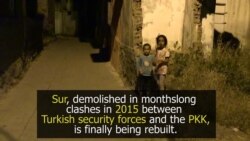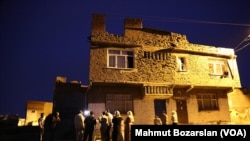Sur, a central district in Diyarbakir that was destroyed in the monthslong clashes in 2015 between Turkish security forces and the youth branch of the Kurdistan Workers Party (PKK), is finally being rebuilt.
But some families are refusing to leave their homes, saying a state-sponsored subsidy is too low. Power and water to the district have been cut, meaning families have no electricity and must carry water for their needs.
At night, the streets of Ali Pasa and Lalebey neighborhoods in Sur are mostly dark because of the power outage, with a few street lamps as the only light source. The residents gather under the lamps to talk about only one topic: the clearing out of the district.
Two neighborhoods have evacuated.
Some families who got subsidies left Sur for good. Other families, who said the subsidies were too low, sought legal help. But even as their lawsuits are making their way through the courts, some residents have been forced to leave. Still others have refused to abandon the city, which led to the government's decision to cut power and water to Sur.
For those residents who remain, they carry water for their daily needs and sit under street lamps until they go to bed. It's been three days, and the residents are frustrated.
Cemal Tayurak, who lives with 19 other people in one house, told VOA, "They're forcing us to leave by cutting electricity and water. The subsidy they gave for my 135-square-meter house is 87,000 Turkish liras [U.S. $24,285]. Twenty people live here. Where can we go with this little money? We don't know where to go, we're desperate. We're poor, that's why we live here."
Sitki Aktas says he's tired of carrying water.
"You see how dirty we are. I couldn't even pray. No water, no power. I have four kids living with me. We are 20 people in total," Aktas said. "They gave 105,000 Turkish liras [U.S. $29,309]. Where can we go? I'm carrying water from the mosque since this morning."
WATCH: Sur Residents Talk about their Inability to Leave
The women suffer more from the lack of water, because it limits what housework they can do.
Cahide Toprak told VOA that time doesn't pass without electricity and water.
"I'm desperate," Toprak said. "We all sit here. I don't have any means to leave. We've collected our stuff and [are] waiting. Come see our situation in our house. The state, the municipality don't give us water. What else can I say?"
For security reasons, the street lamps are still powered.
But as Ramadan, the holy month in Islam, is about to start, the residents are feeling more anxious. The lack of electricity and water will make it harder for them to fast.
PHOTOS: Some Sur Residents Remain After Electricity, Water Cut








